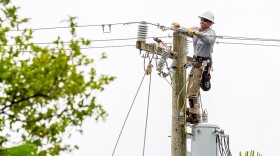-
The Key Biscayne Council is expected to take formal steps on the project at its Feb. 10 meeting, moving to bury all utility lines in a project that Mayor Joe Rasco said at the workshop will cost up to $81 million, nearly double the 2019 estimated cost of $46 million.
-
For at least one water utility in Central Florida, PFAS settlement payments are starting to arrive.
-
Florida Power & Light’s proposed rate hike will have its first hearing on Monday before the Florida Public Service Commission. Ahead of the hearing, consumer activist groups held a press briefing to press the PSC to reject it.
-
Residential rates would be raised about 2.5% through 2029 under a new rate plan Florida Power & Light said that it plans to formally file. The new rates would be set once the utility's current base rate agreement concludes at the end of 2025.
-
The Florida Supreme Court rejected a challenge to state regulators’ approval of long-term utility plans aimed at bolstering the electric system to better withstand hurricanes.
-
Utility leaders say they are responding to a trend of stronger and more unpredictable hurricanes as the 2024 outlook calls for what may be the busiest hurricane season ever.
-
Existing coal and new natural gas-fired power plants that run more than 40% of the time will have to eliminate 90% of their carbon dioxide emissions.
-
The Florida Public Service Commission are bring up their concerns to the EPA over a federal proposal aimed at reducing greenhouse-gas emissions from power plants. State regulators argue that the changes could drive up costs for consumers and hurt the reliability of the state’s electric system.
-
In 2022, American consumers faced the highest electricity costs in more than 40 years, due to inflation, a rebounding economy and fuel-related repercussions from the Ukraine conflict.
-
The Florida Supreme Court heard arguments in two challenges to the Florida Public Service Commission’s approval in late 2021 of the four-year settlement, which began increasing FPL customers’ rates last year.
-
The Florida Supreme Court is scheduled to hear arguments over Florida Power and Light's increased rates.
-
Eric Silagy, the CEO of Florida Power & Light unexpectedly announced his retirement. The company said the move was not connected to a burgeoning political spending scandal.
Play Live Radio
Next Up:
0:00
0:00
Available On Air Stations












